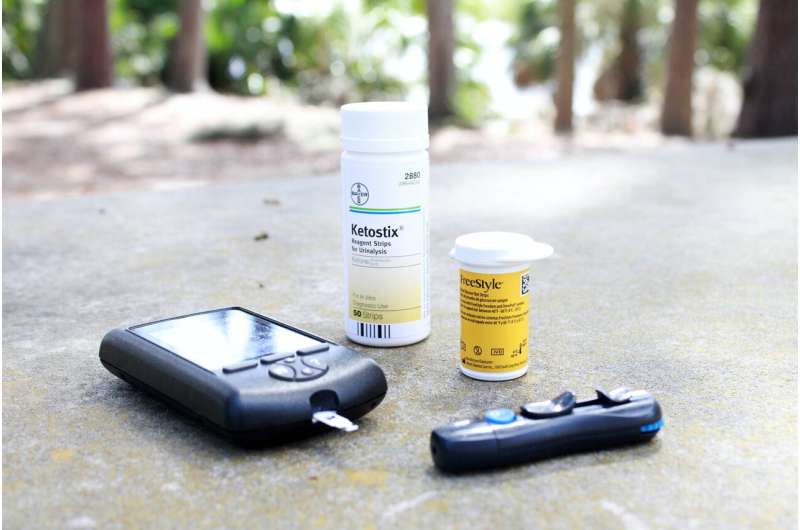
South Texas youth whose Type 2 diabetes was followed for up to 15 years in the TODAY studies have made an immensely important contribution to understanding the early onset form of the disease, clinicians and researchers at UT Health San Antonio and University Health’s Texas Diabetes Institute said today.
The studies, published July 29 in the New England Journal of Medicine, showed that within 15 years of a Type 2 diabetes diagnosis, 60% of participants had at least one diabetes-related complication, and nearly a third of participants had two or more.
“Through this study, we really appreciated that Type 2 diabetes in youth is way more aggressive than the type of diabetes we see in their grandparents,” said Maria “Sukie” Rayas, MD, assistant professor of pediatric endocrinology at UT Health San Antonio.
“Now we have affirmation of how bad the complications are and how rapidly they can actually occur,” said Elia Escaname, MD, assistant professor of pediatric endocrinology and medical director of the children’s clinic at the Texas Diabetes Institute.
Study conducted on West Side
Dr. Rayas and Dr. Escaname served as co-investigators of the San Antonio TODAY study, for which Jane Lynch, MD, professor of pediatric endocrinology, was principal investigator. All patients attended appointments at University Health’s Texas Diabetes Institute on San Antonio’s West Side. TODAY stands for Treatment Options for Type 2 Diabetes in Adolescents and Youth.
“The findings are really astonishing, to think that someone in their mid-20s is already struggling with kidney disease or eye disease or another complication of diabetes,” Dr. Rayas said.
The study pointed out the lack of approved medications for children under 18 diagnosed with Type 2 diabetes.
“We need to expand treatment options and explore medications that we use widely for adults with Type 2 diabetes to see if they are safe and effective for children,” Dr. Rayas said.
Dr. Escaname added, “Hopefully this study will shed light on the need for more treatment options in children, because lifestyle modification is not enough for a lot of patients.”
Beyond insulin, only metformin, liraglutide and exenatide are approved by the U.S. Food and Drug Administration for the treatment of Type 2 diabetes in children and adolescents ages 10-17. Only insulin and metformin are approved for children under 10.
Health determinants
The TODAY findings also highlighted the study population’s lack of access both to healthy lifestyles and to medications and health care providers.
“Some families and children miss basic necessities such as healthy food options and parks and places where children can safely go out and play and exercise,” Dr. Escaname said. “We must assess this when counseling lifestyle modifications. Lack of necessities is one of the main reasons children have developed an issue in the first place.”
San Antonio, with its Hispanic majority population, was a crucial site for the study. One in seven people in Bexar County has diabetes and many more cases go undiagnosed. The COVID-19 pandemic only intensified the prevalence of Type 2 diabetes in the city and region.
“The rise in Type 2 diabetes is noticed all over South Texas during COVID, and our minority and racial ethnic groups including Hispanics were already more at risk of developing the disease,” Dr. Rayas said.
“We don’t have the new prevalence numbers yet, but in our practice we have observed high rates of new-onset diabetes during the last year,” Dr. Escaname said.
Findings
Study participants were ages 10-17 at the time of enrollment, had been diagnosed with Type 2 diabetes within the past two years, and were overweight or had obesity. The average age of participants after the TODAY studies follow-up was 26.
TODAY found:
- 67% of participants had high blood pressure.
- Nearly 52% had dyslipidemia, or high fat levels in the blood.
- Nearly 55% had kidney disease.
- 32% had evidence of nerve disease.
- 51% had eye disease.
The TODAY studies’ diverse cohort is representative of U.S. youth diagnosed with type 2 diabetes. Study participants had regular, intensive diabetes management through the study at no cost during the original TODAY trial, which researchers note may have actually lowered the rate of complications.
San Antonio participants received diabetes care at no cost to them at the Texas Diabetes Institute. Once they became young adults, participants were seen annually by TODAY staff and were transitioned to primary care providers who prescribed their medications.
“Most stayed on insulin and metformin due to costs at this final phase,” Dr. Lynch said, noting that the burden of high medical expenses precluded the young adults from being on more-expensive medications that might more aggressively treat the diabetes.
Source: Read Full Article